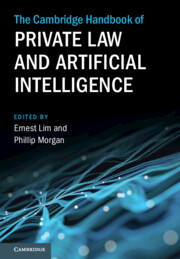Book contents
- The Cambridge Handbook of Private Law and Artificial Intelligence
- Reviews
- The Cambridge Handbook of Private Law and Artificial Intelligence
- Copyright page
- Dedication
- Contents
- Figures
- Table
- Contributors
- Acknowledgements
- Abbreviations
- Introduction
- 1 AI for Lawyers
- 2 Computable Law and AI
- Part I Law of Obligations
- 3 Contract Law and AI
- 4 Self-Driving Contracts and AI
- 5 Consumer Protection Law and AI
- 6 Tort Law and AI
- 7 Automated Vehicle Liability and AI
- 8 Legal Causation and AI
- 9 Product Liability Law and AI
- 10 Appropriation of Personality in the Era of Deepfakes
- 11 Agency Law and AI
- 12 Trust Law and AI
- 13 Unjust Enrichment Law and AI
- Part II Property
- Part III Corporate and Commercial Law
- Part IV Comparative Perspectives
- Index
12 - Trust Law and AI
from Part I - Law of Obligations
Published online by Cambridge University Press: 21 March 2024
- The Cambridge Handbook of Private Law and Artificial Intelligence
- Reviews
- The Cambridge Handbook of Private Law and Artificial Intelligence
- Copyright page
- Dedication
- Contents
- Figures
- Table
- Contributors
- Acknowledgements
- Abbreviations
- Introduction
- 1 AI for Lawyers
- 2 Computable Law and AI
- Part I Law of Obligations
- 3 Contract Law and AI
- 4 Self-Driving Contracts and AI
- 5 Consumer Protection Law and AI
- 6 Tort Law and AI
- 7 Automated Vehicle Liability and AI
- 8 Legal Causation and AI
- 9 Product Liability Law and AI
- 10 Appropriation of Personality in the Era of Deepfakes
- 11 Agency Law and AI
- 12 Trust Law and AI
- 13 Unjust Enrichment Law and AI
- Part II Property
- Part III Corporate and Commercial Law
- Part IV Comparative Perspectives
- Index
Summary
AI will greatly assist in the administration of express and charitable trusts and also be of significant benefit to trust law in acting as an adjudicator. AI should be able to act as an acceptable trustee of an express trust, and resulting trusts do not insurmountably challenge AI, either as trustees or adjudicators. The proposition that discretionary trusts are unsuited to AI administration can be rejected along with the notion that the discretionary nature of remedies makes this area of law unsuited to AI adjudication. Although constructive trusts may pose some difficulties for AI, this may be solved through legal reform. Further, the difficulties that AI trustees will create are not incapable of practical solutions.
Keywords
- Type
- Chapter
- Information
- Publisher: Cambridge University PressPrint publication year: 2024

